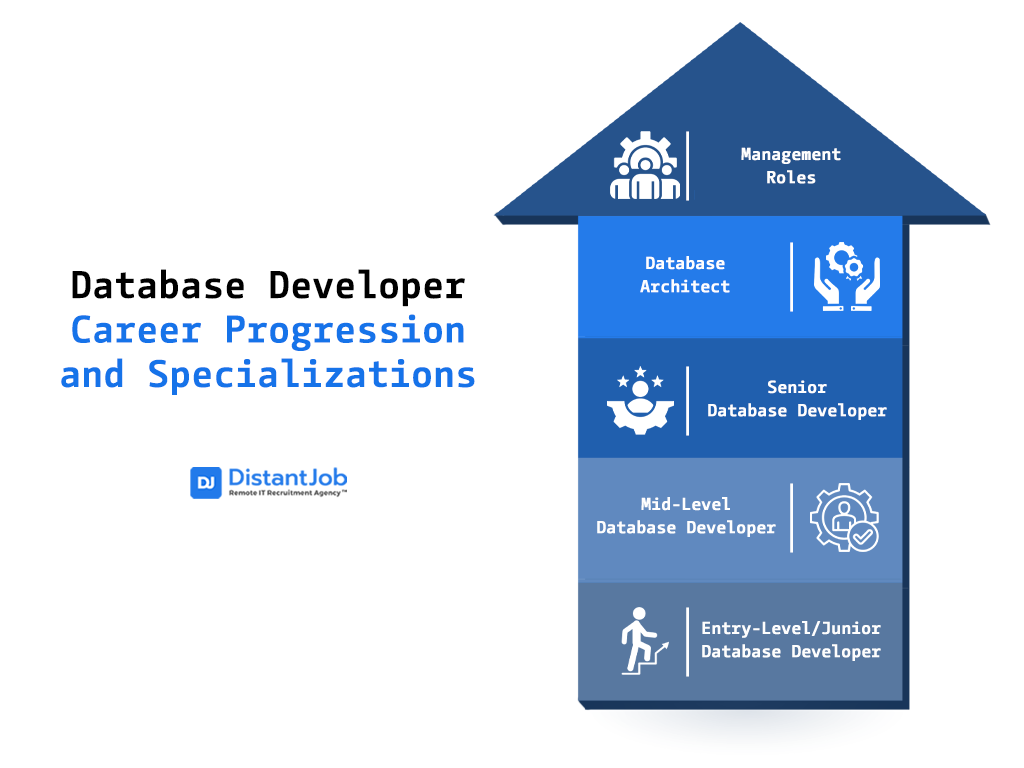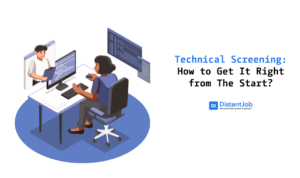With businesses recognizing the importance of data-driven decision-making, the demand for skilled professionals in database development keeps increasing. The US Bureau of Labor Statistics estimates a substantial growth in the demand for database administrators and architects of 8% between 2022 and 2032.
But what exactly is the role of a database developer? What do they bring to the table?
In this article, we’ll explore more about the main responsibilities of database developers, salary expectations and market trends. We’ll also look into tips and strategies to identify top-tier database professionals for those hiring managers looking to expand their teams.
What is a Database Developer?
A database developer is a specialized IT professional responsible for designing, creating, and managing databases. Their role involves structuring data in efficient ways, writing code to build and maintain these databases, and ensuring data security and integrity.
The role of database developers has gained relevancy over time, suggesting an exponential growth in global data creation and usage. For instance, according to Zippia, the projected growth rate for database developers is 21% from 2018 to 2028.
9 Top Skills to Look for In Database Developers
When looking for database development essentials, there are a few skills that are a must-have. Whether you want to hire Database experts or looking to become one, these 9 skills are key for effective database development and management:
- SQL Proficiency – SQL programming skills are a priority to look for in database developers. For starters, developers use SQL (Structured Query Language) to interact with the database, including querying, updating and managing data. Being proficient in SQL is what allows developers to retrieve and manipulate data stored in relational databases.
- Database Design – Database developers need to be skilled in conceptualizing and implementing the structure of a database. For this, they need a deep understanding of how to best organize data and define tables, columns, data types, and relationships between tables.
- Database Administration – As a database developer, you need to understand how to manage and maintain the health of the database. This means creating and setting up databases, monitoring and optimizing performance, ensuring data accuracy and integrity, implementing security measures and managing user access.
- Data Modeling – Data modeling techniques involve creating a visualization of the data and its relationships within a database. It consists of defining how data is connected and how it will be stored and accessed.
- ETL (Extract, Transform, Load) – ETL processes are fundamental in data warehousing and business intelligence. They involve extracting data from different sources, transforming it into a suitable format, and loading it into a database or data warehouse. This skill is important for ensuring data consistency, accuracy and readiness for analysis.
- Backup and Recovery – Developers need to be skilled in creating strategies and implementing procedures for data backup and disaster recovery. This includes regular data backups, testing backups for reliability, and developing recovery plans to restore data in case of loss or corruption, ensuring business continuity.
- Data Security – This skill involves understanding and implementing measures to protect data from unauthorized access, theft, and corruption. It includes developing security policies, conducting security assessments, and monitoring database activities to identify potential security risks.
- ERP and Business Knowledge – As a database developer, you need to understand how database systems support business processes and enterprise resource planning (ERP) systems. It involves comprehending business workflows, data integration, and how various business systems interact with the database, which is crucial for aligning database design with business objectives.
- Soft Skills – Besides technical skills, as you’ll also work collaboratively with teams, you need to have soft skills that include project management, problem-solving abilities, effective communication and attention to detail.
Educational Pathways for Aspiring Database Developers
In most cases, to become a database developer, you start by having a Bachelor’s degree in computer science, software engineering or a related field.
For a junior-level database role, a Bachelor’s degree may be enough. But for higher-level roles, you can consider taking a Master’s degree or getting specialized database developer certifications that include Computer Science, Data Science or Database Management.
One minor note is that it’s not an obligation to have bachelor’s studies to become a database developer. There are many database developer training courses that have strong foundations and can help you land jobs. Let’s explore some of these:
- Certifications – Certifications are a great way to specialize in specific database technologies. Popular certifications include: Azure Database Administrator Associate, Oracle Database Certification, IBM Certified Database Administrator and Certified MongoDB Developer.
- Online Courses and Tutorials – Popular online platforms like Coursera, Udemy and edX offer courses on database development, SQL, NoSQL, database management systems and more.
- Bootcamps – Coding bootcamps provide a great opportunity to gain skills rapidly as they are focused on short-term intensive training. You can look for local university bootcamps tailored specifically for database development.
- Internships – If you have a basic understanding of databases, then gaining work experience through internships or entry-level positions in IT can be invaluable. These opportunities provide hands-on experience and insights into the role of a database developer in a real-world setting.
What A Day in the Life of a Database Developer Looks Like
While the responsibilities and role overall of a database developer depend on the company and its projects, here’s a general overview of what you can expect regarding your daily tasks.
Core Responsibilities:
- Database design and development: A significant part of your date will be dedicated to designing and developing database systems. This involves writing and optimizing SQL queries, designing schema and implementing database features.
- Testing and debugging: You’ll test newly developed databases or modifications to ensure they function properly. Additionally, you’ll debug any issues that may come up.
- Performance tuning: Part of your job involves frequently monitoring and tuning databases to optimize performance. This can involve adjusting queries, indexing or restructuring databases for efficiency.
- Data analysis and reporting: You’ll also spend time analyzing data to extract insights and turn them into reports for other departments or stakeholders.
- Project management activities: Part of your day may involve project management. This includes planning, setting timelines, and coordinating with team members on project tasks.
- Stand-up meetings: Many IT teams have daily or weekly stand-up meetings to discuss progress on projects and next steps.
Career Progression and Specializations
So, what does the database developer career path normally look like? Career progression within database development typically follows a path from junior to senior roles. You can expand your opportunities by seeking database developer training and courses as well as specializing in different areas that include Warehousing, Big Data, and more.
The key here is to also keep up with the trends and data landscape that is always changing.
Generally, the database development career path looks like this:

- Entry-Level / Junior Database Developer: This role is the starting point for many in the field. Your responsibilities will include basic database design and maintenance, writing simple SQL queries, and assisting senior developers.
- Mid-Level / Database Developer: With a few years of experience, database developers at this level handle more complex tasks such as advanced database design, performance tuning, and optimization.
- Senior Database Developer: Senior developers have extensive experience and deep expertise in database technologies. They lead major projects, mentor junior staff, and make key decisions regarding database architecture and technologies.
- Database Architect: This is a more strategic role, focusing on designing database solutions for complex systems, often at an enterprise level.
- Management Roles: Experienced professionals may move into management roles, such as IT Manager or Database Manager, where they oversee teams and strategic planning for database systems.
Database Specializations
- Data Warehousing Specialization: Specializing in data warehousing involves designing and maintaining large repositories of historical data from multiple sources. Skills in ETL processes, data integration, and BI tools are crucial.
- Big Data and Database Development: Specialization in Big Data entails working with large, complex data sets. Skills in technologies like Hadoop, Spark, and NoSQL databases are essential.
- Database Security: Focusing on database security involves ensuring the integrity and security of data. This includes implementing security protocols, monitoring access, and compliance with data protection laws.
- Cloud Database Management: With the rise of cloud computing, specialization in cloud-based database solutions like AWS RDS, Azure SQL Database, and Google Cloud SQL is increasingly valuable.
- Database Optimization and Performance Tuning: This specialization focuses on maximizing the efficiency and performance of database systems. It requires deep knowledge of database internals and performance metrics.
- Specializations also involve the latest technologies and trends. Nowadays, popular options are machine learning and AI integrations, NoSQL and NewSQL databases and automation in database management.
6. Salary Expectations and Market Trends
The database developer job market continues to grow as data becomes the center of companies’ operations. But, when it comes to salary expectations the reality is that it depends on several factors. Location, level of experience and specialization can directly impact how much a database developer earns.
Let’s go over the different salary rates on a global scale:
Regional Salary Guide for Database Developers
If you live in the U.S., the average salary for a database developer is approximately $106,846 per year, and the average hourly wage is around $65.00.
On the other hand, developers from South America, given the cost of living, earn an average of between $40,000 and $65,000 per year (between $20 and $30 per hour).
Similar rates can be found in Eastern European countries, where the average salary of a database developer ranges from $57,000 to $80,000 per year (between $27 and $38 per hour).
Asian countries such as India and The Philippines tend to have lower rates ranging from $35,000 to $50,000 per year ($16 and $24 per hour).
Again, these are average rates. More specialized database positions will earn significantly more, regardless of the location.
5 Key Factors That Influence Salaries
- Experience Level: Junior vs. Mid-level vs. Senior.
- Skills and Specialization: SQL, NoSQL, Oracle, cloud technologies.
- Industry: Finance, technology, healthcare sectors might offer higher salaries.
- Company Size: Larger corporations vs. startups.
- Economic Conditions: Local cost of living, currency value, demand for tech talent.
7. For Hiring Managers: Identifying the Right Database Developer
Hiring tech talent is always challenging, particularly when it comes to identifying suitable candidates. In this case, where you’re looking for a specific technology, the resume is the least important aspect you should care about.
Hiring criteria for database developers go from evaluating technical expertise and project experience to going beyond, making sure they also have the soft skills and culture fit your team needs.
Here’s a guide, divided into different categories, on what you should look for when evaluating database developers.
Technical Expertise (The Basics)
- Database skills: Evaluate proficiency in SQL and knowledge of NoSQL databases. Familiarity with database design, normalization, and performance tuning is essential.
- Programming Languages: Candidates should be proficient in languages commonly used in database work, like PL/SQL, T-SQL, Python, or Java.
- Experience with Database Technologies: Familiarity with popular database management systems like MySQL, Oracle, Microsoft SQL Server, PostgreSQL, and MongoDB is desirable.
- Data Modeling and Warehousing: Candidates should understand data modeling concepts and have experience with data warehousing tools and ETL processes.
- Understanding of Cloud-Based Databases: Knowledge of cloud services like AWS RDS, Azure SQL Database, or Google Cloud SQL is a plus.
Project Experience
- Relevant Industry Experience: Look for candidates with experience in your industry. This way, they are more familiarized with the specific challenges and requirements of your sector.
- Size and Scope of Previous Projects: Check out previous projects they’ve completed and understand their size and complexity. This will help you define and give you insights into their capability to handle your projects.
Interviewing and Assessment
- Technical Interviews and Tests: Conduct interviews or tests to assess their technical knowledge and problem-solving skills.
- Scenario-Based Questions: Present real-world scenarios they might encounter in the role and assess their approach to solving these problems.
- Soft Skills Assessment: Use behavioral interview techniques to evaluate communication, teamwork, and adaptability.
- References and Past Work: Check references and, if possible, review examples of their previous work.
- Cultural Fit: Make sure the candidate aligns with your company’s culture and values.
Tackling technical interviews can be challenging, particularly for a database development role. This table can give you a general outline of what technical tests you can conduct, and that way, make sure you’re hiring the right candidate.
| Type of Test | Description |
| SQL Proficiency Test | Given a sample database schema with tables for customers, orders, and products, the candidate is tasked with writing SQL queries to: 1) Find all customers who have not placed any orders in the last year. 2) Calculate the total revenue generated per product category. 3) Identify the top 5 customers by order value in the current year. |
| Database Design and Normalization Test | The candidate is given a description of a business model (e.g., an e-commerce platform) and is asked to: 1) Design a relational database schema to support the business requirements. 2) Normalize the database schema to the third normal form, explaining their rationale for each normalization step. |
| Debugging and Optimization Test | Present a poorly performing SQL query and a corresponding database schema. Ask the candidate to: 1) Identify inefficiencies in the query. 2) Rewrite the query for improved performance, possibly involving indexing strategies. |
| Data Modeling Case Study | Provide a complex real-world scenario (like a university management system) and ask the candidate to: 1) Develop a comprehensive data model including entities, relationships, and key constraints.2) Discuss how their model handles scalability and data consistency issues. |
| Theory and Concepts Quiz | 1. Explain the difference between a clustered and a non-clustered index. 2. What are ACID properties in a database?3. Describe the differences between OLTP and OLAP systems. |
| Security and Data Integrity Test | Given a scenario where sensitive data needs to be stored (like personal customer information), ask the candidate to: 1) Outline the security measures they would implement to protect the data. 2) Discuss strategies for ensuring data integrity and consistency. |
| Version Control and Deployment Exercise | 1) Demonstrate how to manage database schema changes using a version control system like Git. 2) Outline the steps for safely deploying database changes to a production environment. |
| Data Analysis and Reporting Task | Using a sample dataset (like sales data), ask the candidate to: 1) Create a report that summarizes key metrics (like monthly sales growth). 2) Write complex SQL queries to extract insights from the data. |
Hire a Skilled Database Developer Today!
From SQL proficiency to security awareness, from data modeling to performance optimization, a skilled database developer will transform the way your company handles data.
However, finding the ideal candidate goes beyond evaluating their technical expertise. It’s also about their ability to solve problems, adapt to your team and contribute to your company’s objectives.
So, how can you find the ideal candidate without breaking the bank? Hire with us.
From headhunting to taking care of all the HR hassle, at DistantJob, we provide ongoing support throughout the hiring process. We focus on your company hiring the right people to build ever-lasting relationships.
Ready to take the next step? Let’s talk.



